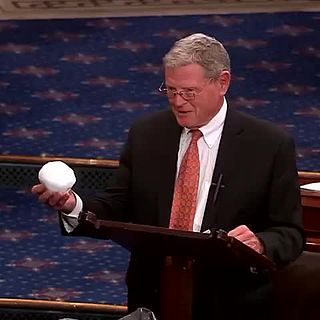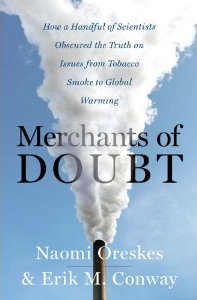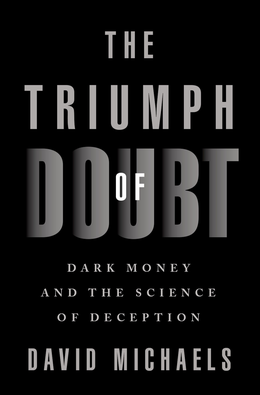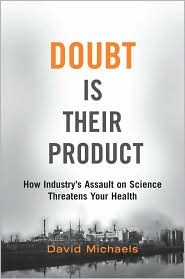Junk science is spurious or fraudulent scientific data, research, or analysis. The concept is often invoked in political and legal contexts where facts and scientific results have a great amount of weight in making a determination. It usually conveys a pejorative connotation that the research has been untowardly driven by political, ideological, financial, or otherwise unscientific motives.

A cigarette is a narrow cylinder containing a combustible material, typically tobacco, that is rolled into thin paper for smoking. The cigarette is ignited at one end, causing it to smolder; the resulting smoke is orally inhaled via the opposite end. Cigarette smoking is the most common method of tobacco consumption. The term cigarette, as commonly used, refers to a tobacco cigarette, but the word is sometimes used to refer to other substances, such as a cannabis cigarette or a herbal cigarette. A cigarette is distinguished from a cigar by its usually smaller size, use of processed leaf, different smoking method, and paper wrapping, which is typically white.

The tobacco industry comprises those persons and companies who are engaged in the growth, preparation for sale, shipment, advertisement, and distribution of tobacco and tobacco-related products. It is a global industry; tobacco can grow in any warm, moist environment, which means it can be farmed on all continents except Antarctica.
The politicization of science for political gain occurs when government, business, or advocacy groups use legal or economic pressure to influence the findings of scientific research or the way it is disseminated, reported or interpreted. The politicization of science may also negatively affect academic and scientific freedom, and as a result it is considered taboo to mix politics with science. Historically, groups have conducted various campaigns to promote their interests, many times in defiance of scientific consensus, and in an effort to manipulate public policy.

Rolling paper is a specialty paper used for making cigarettes. Rolling papers are packs of several cigarette-size sheets, often folded inside a cardboard wrapper. They are also known as 'blanks', which are used to encase tobacco or cannabis. It may be flavoured.

The Toxic Substances Control Act (TSCA) is a United States law, passed by the 94th United States Congress in 1976 and administered by the United States Environmental Protection Agency (EPA), that regulates chemicals not regulated by other U.S. federal statutes, including chemicals already in commerce and the introduction of new chemicals. When the TSCA was put into place, all existing chemicals were considered to be safe for use and subsequently grandfathered in. Its three main objectives are to assess and regulate new commercial chemicals before they enter the market, to regulate chemicals already existing in 1976 that posed an "unreasonable risk of injury to health or the environment", as for example PCBs, lead, mercury and radon, and to regulate these chemicals' distribution and use.

A beedi is a thin cigarette or mini-cigar filled with tobacco flake and commonly wrapped in a tendu or Piliostigma racemosum leaf tied with a string or adhesive at one end. It originates from the Indian subcontinent. The name is derived from the Marwari word beeda—a mixture of betel nuts, herbs, and spices wrapped in a leaf. It is a traditional method of tobacco use throughout South Asia and parts of the Middle East, where beedies are popular and inexpensive. In India, beedi consumption outpaces conventional cigarettes, accounting for 48% of all Indian tobacco consumption in 2008.

Within the sociology of knowledge, agnotology is the study of deliberate, culturally induced ignorance or doubt, typically to sell a product, influence opinion, or win favour, particularly through the publication of inaccurate or misleading scientific data (disinformation). More generally, the term includes the condition where more knowledge of a subject creates greater uncertainty.

An electronic cigarette (e-cigarette), or vape, is a device that simulates tobacco smoking. It consists of an atomizer, a power source such as a battery, and a container such as a cartridge or tank. Instead of smoke, the user inhales vapor. As such, using an e-cigarette is often called "vaping". The atomizer is a heating element that vaporizes a liquid solution called e-liquid, which quickly cools into an aerosol of tiny droplets, vapor and air. The vapor mainly comprises propylene glycol and/or glycerin, usually with nicotine and flavoring. Its exact composition varies, and depends on several things including user behavior.
The Weinberg Group is a Washington, DC–based food and drug regulatory consulting group. Founded in 1983, the firm assists pharmaceutical and biotech companies with the "development and implementation of successful and innovative regulatory strategies" and also helps these companies to "remediate, maintain and improve their regulatory compliance." The Weinberg Group sent a memo to DuPont in 2003 recommending that the company “reshape the debate by identifying the likely known health benefits of PFOA exposure.”

A Frank Statement to Cigarette Smokers was a historic first advertisement in a campaign run by major American tobacco companies on January 4, 1954, to create doubt by disputing recent scientific studies linking smoking cigarettes to lung cancer and other dangerous health effects.

Tobacco politics refers to the politics surrounding the use and distribution of tobacco, likewise with regulations.

David Michaels is an American epidemiologist and professor in the Departments of Environmental and Occupational Health and Epidemiology at the Milken Institute School of Public Health of the George Washington University. He held high-level, senate-confirmed public health positions in the administrations of Presidents Barack Obama and Bill Clinton, including a stint from 2009 to 2017 as the administrator of the Occupational Safety and Health Administration.

Merchants of Doubt: How a Handful of Scientists Obscured the Truth on Issues from Tobacco Smoke to Global Warming is a 2010 non-fiction book by American historians of science Naomi Oreskes and Erik M. Conway. It identifies parallels between the global warming controversy and earlier controversies over tobacco smoking, acid rain, DDT, and the hole in the ozone layer. Oreskes and Conway write that in each case "keeping the controversy alive" by spreading doubt and confusion after a scientific consensus had been reached was the basic strategy of those opposing action. In particular, they show that Fred Seitz, Fred Singer, and a few other contrarian scientists joined forces with conservative think tanks and private corporations to challenge the scientific consensus on many contemporary issues.
Funding bias, also known as sponsorship bias, funding outcome bias, funding publication bias, and funding effect, refers to the tendency of a scientific study to support the interests of the study's financial sponsor. This phenomenon is recognized sufficiently that researchers undertake studies to examine bias in past published studies. Funding bias has been associated, in particular, with research into chemical toxicity, tobacco, and pharmaceutical drugs. It is an instance of experimenter's bias.
A manufactured controversy is a contrived disagreement, typically motivated by profit or ideology, designed to create public confusion concerning an issue about which there is no substantial academic dispute. This concept has also been referred to as manufactured uncertainty.

Merchants of Doubt is a 2014 American documentary film directed by Robert Kenner and inspired by the 2010 book of the same name by Naomi Oreskes and Erik M. Conway. The film traces the use of public relations tactics that were originally developed by the tobacco industry to protect their business from research indicating health risks from smoking. The most prominent of these tactics is the cultivation of scientists and others who successfully cast doubt on scientific results. Using a professional magician, the film explores the analogy between these tactics and the methods used by magicians to distract their audiences from observing how illusions are performed. For the tobacco industry, the tactics successfully delayed government regulation until long after the establishment of scientific consensus about the health risks from smoking. As its second example, the film describes how manufacturers of flame retardants worked to protect their sales after toxic effects of the retardants were reported in the scientific literature. The central concern of the film is the ongoing use of these tactics to forestall governmental action to regulate greenhouse gas emissions in response to the risks of global climate change.
Scientific dissent is dissent from scientific consensus. Disagreements can be useful for finding problems in underlying assumptions, methodologies, and reasoning, as well as for generating and testing new ways of tackling the unknown. In modern times, with the increased role of science on the society and the politicization of science, a new aspect gained prominence: effects of scientific dissent on public policies.

The Triumph of Doubt: Dark Money and the Science of Deception is a book by David Michaels that was published in 2020.

The tobacco industry playbook, tobacco strategy or simply disinformation playbook describes a strategy devised by the tobacco industry in the 1950s to protect revenues in the face of mounting evidence of links between tobacco smoke and serious illnesses, primarily cancer. Much of the playbook is known from industry documents made public by whistleblowers or as a result of the Tobacco Master Settlement Agreement. These documents are now curated by the UCSF Truth Tobacco Industry Documents project and are a primary source for much commentary on both the tobacco playbook and its similarities to the tactics used by other industries, notably the fossil fuel industry. It is possible that the playbook may even have originated with the oil industry.













